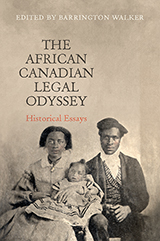edited by Barrington Walker, Professor, Department of History, Queens University. Published with the University of Toronto Press, 2012.
One of the central themes of the new legal history of the past two decades has been exploration of the law’s role in shaping the lives and experiences of historically marginalised groups in our society. The Osgoode Society has made a number of contributions to that enterprise, and we are pleased to do so again with this collection, which Professor Walker has compiled. It consists of both new essays and a few ‘classic’ articles in the field, and is anchored by a sweeping introduction summarising the state of the field and suggesting new lines of research for the future. The various essays examine both civil and criminal cases, as well as looking at black legal pioneers and Canadian slave law. A theme which comes through consistently is that of the contrast between formal legal equality and the ways in which the law, particularly private law, failed to ensure substantive social and economic equality.


